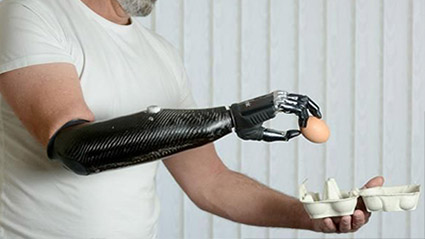Amputees consider their prosthetic limb is an extension of their own body
20 August 2018

Merely having the prosthetic limb is not enough to assist the amputees with their activities. Many amputees skip the extended use of their prosthetic limb as their misplaced limb does not meet the criteria of their prosthesis. This actually means that its own discernment of misplaced limb or the brain’s depiction of it does not collate with what they observe of prosthesis.
The deep rooted problem is dual. Amputees still perceive their missing limb even if it does not exist anymore; this artificial limb is discerned as much compact as the lost limb. In the market obtainable prosthetic limb is devoid of sensory perception. What is visible is the reality as there is absence of sense of touch from the prosthetic limb and it needs continuous observation for accurate usage.
Now with the advent of EPFL scientists portray that amputees can actually feel that the prosthetic hand is a part of their own body. They have researched further and have come to a conclusion that there is something beyond seeing is believing expression based on the fundamental research on how the brain perceives what an integral part of its own body is. Not only do they decipher the sense of sight but also involve the sense of touch in their new experiment.
Giulio Rognini of EPFL’s Laboratory of Cognitive Neuroprosthetics led by Olaf Blanke said that the brain repeatedly utilizes its senses to assess what is coherent to the body and what is external to it.
Author : Calvin Wagner – The Low Ball, Healthcare >
Press Coverage
EPFL News >
Le Matin (FR) >
Info Hightech (FR) >
